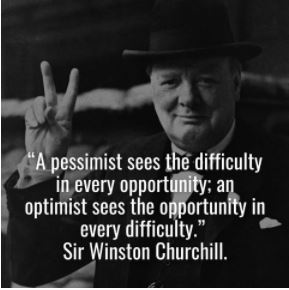F*** 2020, Here’s How to Get 2021 Back on Track…
You probably had big plans to make 2020 your best year yet. You had the drive to chase new goals and reach greater heights in your personal life and career.
But as we all know, the year took a bizarre and unexpected turn towards the worst within a few months of us all yelling “happy new year”.
In what was one of the longest and most frustrating years yet, 2020 put many dreams on hold. And though we’ve made it through to a new year, everyone is still trying to find their way back into some sense of normality.
COVID struck hard leaving many people and societies at a standstill while watching their economies crash and unemployment numbers spike to the highest level in many years.
To make the situation even worse, people were fed (and believed) divisive conspiracy theories that only fuelled society’s anxiety.

But as Winston Churchill famously had said, “A pessimist sees the difficulty in every opportunity; an optimist sees the opportunity in every difficulty.”
With that mindset, there are good reasons to be optimistic in 2021.
While we can’t undo the changes forced upon, we can look to the future with hope and make 2021 the most prosperous year yet.
What’s your 2021 New Year’s Resolution?
How often have you proclaimed, “New year, new me” as the clock strikes midnight on the last day of the year? Likewise, how long did it take to break your resolution or fall back into bad habits?
It’s no wonder these resolutions fail, saying ‘I’ll get fit” or “I’ll give up drinking alcohol” sounds great but it’s not really practical if it doesn’t have a plan of action.
But if anything is to be learned out of 2020, it’s that there’s one resolution that should be introduced and kept – securing your financial future.
At a time when the world’s economy is down, and the bounce back is expected to take years, it’s the perfect moment to shift your focus to pursuing financial stability.
And one massive opportunity to achieve it is by investing in the $33 trillion dollars US residential property market.
COVID left the housing inventory all over the world in short supply, and this caused prices to rise. But it had seemingly almost no effect on demand. Many homebuyers were set on moving out of the city and into the suburbs. While others were scaling back and seeking to buy cost-efficient homes. And this made the competition tougher than ever, because people needed to act fast.
Experts say that this will continue in 2021. Investment analysts foresee that the US residential property market demand will only continue to rise because of several factors like lower mortgage interest and a trend among many to relocate away from the city to suburban areas.
For example, home values in Detroit increased by more than 92% over the last five years. And in the next 12 months, they’re projected to grow by another 12.2%. Demand continues to rise, because people are now evaluating the places they’ve been living in and assessing it against the future they actually want.
Why your New Year’s Resolution should be investing in the US residential property market
If you want to safeguard your future financially, consider investing in the US residential property market. After all, it’s never too late to add another resolution to your list for 2021.
Here are several reasons why:
1. Low interest rates
Banks worldwide are maintaining low interest rates as a way to help the economy recover post-COVID. The US Federal Reserve stressed interest rates near zero will continue until at least 2023.
When interest rates are low, spending is encouraged. Borrowing becomes cheaper, thus making large purchases on credit — such as the purchase of a home — more affordable.
The average rate for a 30-year fixed mortgage dropped from 3.62% in January 2020 to 2.68% in December 2020. There has been a consistent 0.7%-0.8% drop each month, and it’s expected to continue in 2021.
Now that mortgage interest rates are set to stay low for the next few years, property investors have more time to prepare for their purchase.
They can carefully weigh up their options and wait for more homes to go on sale. Given that the housing market is competitive and demand is high, it will only be a matter of time.
Until then, buyers can work on securing their mortgage requirements and pre-approval applications. So, when they finally find a property they want, they can get ahead of their competitors.
2. Introduction of stimulus package
In March 2020, the U.S. government signed the CARES Act, a $2 trillion USD COVID-relief act given in the form of stimulus checks. Individuals and businesses eligible for tax rebates received these checks.
The stimulus act was designed to help in two ways:
- The money provides financial assistance to low-income persons and families to help keep up with their bills.
- It was given knowing people would spend it immediately, in turn avoiding any stagnancy in the economy.
The initial package included $1,200 USD per adult and $500 USD per child for households whose income was less than $99,000 for single taxpayers and $198,000 for couples.
Moreover, a new bill known as the Consolidated Appropriations Act of 2021, or CARES Act 2, was passed on December 21, 2020. This paved the way for another $600 USD given to qualified individuals and their dependents.
While this doesn’t directly affect the real estate market, it does have some influence on it. Because a significant percentage of taxes has been waived, people have money to spend. Those who are wise enough are putting that money into purchasing properties. For foreign investors, this shows why now is the right time to capitalise on the U.S housing market, as higher spending will allow it to recover faster, and property value will then increase.
3. A new wave of growth is emerging
The global real estate market is headed for immense growth in 2021.
Australia’s excellent response to COVID-19 has brought back the momentum for the housing market. In 2020, Sydney saw the biggest increase in house prices (12%), followed by Melbourne (10.8), and Hobart (7%). First-time home buyers are coming back, and it’s also attracting foreign investment.
New Zealand also has a new wave of growth emerging. Rising housing prices in the country are a result of demand outweighing supply and relatively low interest rates which is forecast to sustain until the end of the year. Average prices for a house in New Zealand is now $788,967, an increase of 2.6% in just a few months despite a 6.1% growth in 2020’s final quarter.
But while the market is hot in Australia and New Zealand, costs are still incredibly high with limited options. The turnover also takes longer, which incurs higher expenses for foreign buyers.
In the US, home sales increased by 10.5% in August 2020 from the previous year. First-time homebuyers accounted for 33% of total sales.
During this period, 69% of homes were on the market for less than a month. Properties typically stay on the market for more than a month, but in 2020, the average turnover was only 22 days.
This faster turnover rate means owners are selling quickly and there are numerous buyers available. Anyone who is ready to buy can enjoy their new investment home sooner.
Fortune favours the brave: it’s an opportunity to take now
All this indicates that investing in property is a great strategy to achieve financial stability. But succeeding in this endeavour requires learning and, like a New Year’s Resolution, the focus to see it through. That’s what Star Dynamic client, Katie Potter did.
When she decided to invest, she didn’t reap the benefits overnight. Instead, she broke her property investment dream into actionable steps and remained committed until she achieved her ultimate goal – two investment properties within nine months.
Like Katie, you have the opportunity to safeguard your future and enjoy passive income. We’ve created a free e-book to help get started on everything you need to know about investing in the US residential property market.
If you’re interested to know more and want to speak with us, contact us today.



